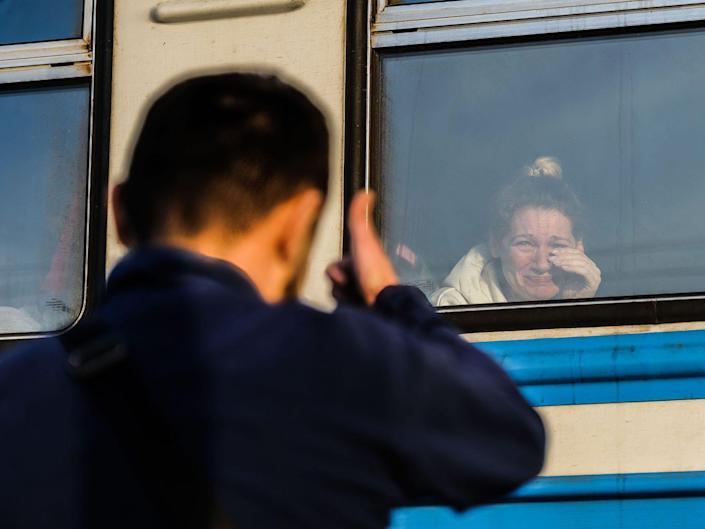
Viktoria Lisianska’s eyes immediately welled up with tears when Insider asked if any of her family was still back across the border in Ukraine. “Yes, my parents,” she said. “I begged them to go with us,” but they didn’t want to leave.
“I just had to leave because I had to save the life of my child,” she said.
Sitting on a cot in a shopping mall that had been turned into a refugee transit center in Korczowa, Poland, she looked simultaneously exhausted and alert — as if she couldn’t believe that she was finally in a safe place.
Lisianska, 36, fled with her daughter and niece from Kharkiv, Ukraine’s second-largest city, which Russian troops have been indiscriminately attacking with a relentless barrage of artillery, rockets, and missiles. Her daughter’s school was bombed, she said, and it no longer exists. The windows of her home in Kharkiv were also shattered amid the Russian onslaught.
“They’re bombing schools…They’re bombing everywhere, just everywhere,” Lisianska said of the Russian military. She was on her way to Berlin, with no idea when she’d be able to return to Ukraine.
Her story shares the contours of so many of the millions of Ukrainians who’ve fled their country.
They’ve been through hell. They’ve left family behind, and are terrified they’ll never see them again.
They’ve traveled for hours and hours to reach safety in Poland, Hungary, and other neighboring countries as Russian attacks slaughter civilians and shatter infrastructure. Many wondered if they were really safe now.
By foot, bus, and train, they’ve left their homes because of Russian President Vladimir Putin’s unprovoked war in their country. Russia has repeatedly targeted civilian areas in Ukraine, bombing hospitals and theaters — killing pregnant women, children, and journalists in the process. The war is only a few weeks old, and Russia has already been widely accused of war crimes.


More than three million Ukrainians have left since Russia attacked their country in late February. Though it could be some time before they’re able to return home, a number of Ukrainians in Poland told Insider they do not want to pursue refugee status.
Yulia, 30, a hairdresser from a town near Kyiv, brought her hairdressing kit with her on the harrowing journey into Poland. She’s heading to Germany. Like many Ukrainian refugees Insider spoke to, she only offered her first name.
She doesn’t want to be seen as a refugee, she said, laying out the shiny tools of her trade on her cot in the Korczowa mall. She just wants to work. Yulia wept while discussing how her parents were still in Ukraine and that she’d fled the country without any of her family.
Men between the ages of 18 and 60 can’t leave Ukraine during the war. Yulia’s father is 59 and therefore barred from exiting the country, and her mother would not leave without him.


Many older Ukrainians have either refused to leave, or have difficulties fleeing due to disabilities. And there are also those who can’t leave because they’re now living in territory occupied by Russia.
Speaking to Insider just moments after entering Poland at the Medyka border crossing, Alyona, 33, from Kyiv, told Insider that she’s hoping to return to Ukraine in two months because her 87-year-old grandmother is stuck an area close to Sumy — a besieged city in the northeastern part of the country.
“It’s very hard to leave,” Alyona said, adding that she’s in contact with her grandmother every day and constantly asks neighbors to check in on her.
“That’s why we should and we want to come back because we left her there,” she said.
There have been rising concerns about xenophobia and racism in Poland in recent years and human rights groups have criticized the Polish government’s treatment of migrants. But the Eastern European nation has rapidly opened its doors for Ukrainian refugees. While there have been reports of people of color in Ukraine facing discrimination as they tried to leave, Polish authorities have said they’re letting everyone in regardless of nationality.
Beyond the government response, many Poles are also volunteering at border crossings, train stations, and other transit hubs across their country as more and more Ukrainians arrive. They offer them free food, water, SIM cards, diapers, strollers, medical care, veterinary services, and more.
People from all over the world have come to Poland to volunteer and help with what UN refugee agency commissioner Filippo Grandi recently described as “the fastest growing refugee crisis in Europe since World War II.” But some volunteers told Insider that they could use more help from the government as well as NGOs that have the resources and experience to handle a crisis of this scale. According to the UN’s latest numbers, nearly two million Ukrainians have entered Poland since the war began — far more than any other country.


Maciej Konieczny, a member of Poland’s parliament from the Left Together party, told Insider that Poland will need financial support to handle the massive influx of refugees. “Our government is not very good in complex logistics,” he said during an interview in Warsaw. “Basically we need a lot of money,” he added, going on to say that Western states also need to help take in more refugees — including the US and UK. The British government has faced criticism for not taking more rapid steps to allow more Ukrainian refugees into the country.
President Joe Biden on Tuesday signed a government funding bill that provided $13.6 billion in emergency aid for Ukraine, including billions in humanitarian and economic assistance. More than $4 billion of that aid will address “the dire humanitarian needs of the hundreds of thousands of refugees who have fled Ukraine or displaced within Ukraine,” per a fact sheet from by the House Appropriations Committee.
Ukrainians in Poland expressed gratitude for the support they’ve received from locals as well as countries across the globe, including the US. But they also simultaneously called on the world to do more to help end the war.
The mantra of many Ukrainians these days is “close the sky.” They want NATO to institute a no-fly zone in Ukraine.
“We need military support,” Lisianska said. “We need to close the sky.”
The Ukrainian army is fighting well and will “kill all the Russians,” Lisianska said, but Ukraine needs help with “bombs coming from the sky.”


Ukrainian President Volodymyr Zelenskyy has repeatedly called for a no-fly zone — including in an emotional address to Congress on Wednesday.
But the alliance and the US have been clear that they oppose a no-fly zone, because it would require NATO to shoot down Russian warplanes and risk a catastrophic escalation.
Ukraine’s fierce resistance has hindered the Russian advance. More than 7,000 Russia troops have been killed in the war, which is less than a month old, according to US estimates. For perspective, 2,461 US troops were killed in Afghanistan over the course of America’s 20-year war there.
The odds are still stacked against Ukraine in many ways, and the Biden administration has expressed growing concerns that Putin could use chemical weapons or other weapons of mass destruction as he grows impatient with the Russian military’s lack of progress on the ground.
Even under these circumstances, many Ukrainians are still optimistic about the outcome of this war.
Ivan, 53, a Ukrainian veteran who spoke to Insider from the Rava-Ruska border crossing on his way into Ukraine with plans to join the fight, said he had “no doubt” Russia will lose the war.
Katerina Kompaniets, 34, who traveled to Poland with seven other family members from Zaporizhzhia, said she was confident Ukraine would win and even regain control of territory in eastern Ukraine that’s been held by pro-Russian rebels since 2014. Her husband fought in Donetsk, a separatist territory that Putin recently recognized as independent, that year.
“We believe in our men,” Kompaniets said.
Marta Yatsenko provided translation services in Poland.
Read the original article on Business Insider




